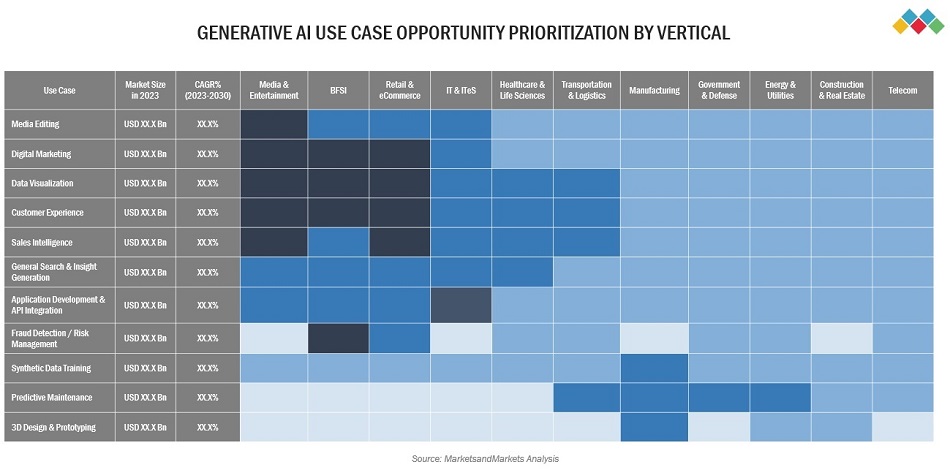1. Generative ai use cases:
Generative AI use cases span a multitude of sectors, from healthcare and marketing to finance and creative arts. In healthcare, it aids in medical image analysis and disease prediction.
Applications of generative AI in banking:
- Chatbots – Use natural language processing to handle customer inquiries and automate conversations.
- Document Analysis – Scan, comprehend, and extract insights from financial documents and contracts.
- Risk Assessment – Analyze customer data and spending patterns to detect fraud and assess loan default risk.
- Marketing Content – Generate personalized promotions and recommendations tailored to each customer.
- Report Generation – Produce summaries, visualizations, and presentations from data.
- Customer Service – Generate responses to FAQs and customer complaints.
- Product Development – Identify new features and offerings based on customer needs.
- Process Automation – Streamline repetitive back-office tasks to improve efficiency.
2. Generative ai trends:
Generative AI trends are shaping the future of artificial intelligence. Larger, more powerful models like GPT-3 and GPT-4 are on the rise, enabling more sophisticated content generation.
Applications of generative ai trends:
- Natural language processing – Generating human-like text and dialogue for applications like chatbots and customer service.
- Computer vision – Creating and editing realistic images and video through AI systems like DALL-E.
- Audio generation – Synthesizing human-like speech and music using models like Jukebox.
- Drug discovery – Designing new pharmaceuticals by predicting molecular structures.
- Content creation – Automating written content and visual assets for marketing and publications.
3. Generative ai use cases healthcare:
Generative AI healthcare is revolutionizing. Its natural language capabilities allow it to read and understand medical records, saving doctors time. It can also generate personalized treatment plans and recommendations based on a patient’s unique health profile.
Applications of generative AI in healthcare:
- Clinical documentation – Automatically generating notes and records from patient encounters.
- Patient chatbots – Answering health-related questions and booking appointments.
- Drug discovery – Identifying or designing new pharmaceutical compounds.
- Diagnostic support – Analyzing medical images and data to detect anomalies.
- Treatment planning – Developing personalized care plans based on patient profiles.
- Clinical trial matching – Identifying suitable clinical trials for patients.
DOWNLOAD- https://www.marketsandmarkets.com/industry-practice/RequestForm.asp?page=Generative%20AI
4. Generative ai use cases business:
Generative AI business is transforming operations. Its ability to generate natural language allows it to automate customer service and summarize business documents with ease. For marketers, it can create targeted content and ad copy tailored to specific audiences.
Applications of generative AI in business:
- Content creation – Automatically generating articles, ads, emails, reports and other content.
- Data analysis – Processing and extracting insights from large datasets.
- Customer service – Powering chatbots and automating responses.
- Marketing personalization – Tailoring messaging and offers to individual customers.
- Forecasting – Predicting future sales, demand, and other metrics.
- Product ideation – Suggesting new product features and innovations.
- Risk assessment – Evaluating business risks and opportunities.
5. Generative ai challenges:
While generative AI promises many benefits, there are still significant challenges to address. As generative AI advances, establishing ethical guidelines and frameworks will be key. Despite current limitations, the technology holds great potential. SEO can help share thoughtful perspectives on overcoming the generative ai challenges.
Challenges facing generative AI applications:
- Bias and fairness – Models can perpetuate harmful biases if trained on skewed datasets.
- Privacy – Generating synthetic data while protecting personal information is difficult.
- Accuracy – Outputs may contain flaws or false information.
- Trust – Users may not trust system outputs for high-stakes decisions.
- Transparency – Lack of explainability around model behavior and decisions.
- Ethics – Potential for misuse and harmful impacts needs governance.
6. Generative ai use cases marketing:
Generative AI is unlocking new possibilities for marketers. Its natural language generation abilities allow it to create tailored ad copy and social media posts that resonate with target audiences. Generative AI can also analyze customer data to derive insights and predict trends. can help educate marketers on adopting these emerging technologies.
Applications of generative AI in marketing:
- Ad copywriting – Automatically generating relevant ad text and creatives.
- Social media content – Producing posts tailored to platforms and audiences.
- Landing pages – Designing customized landing pages for campaigns.
- Email marketing – Personalizing messaging and automating newsletters.
- SEO content – Creating blog posts and web copy optimized for search.
- Market research – Analyzing customer sentiment and feedback.
7. generative ai use cases banking:
Applications of generative AI in banking:
· Customer service chatbots – Provide 24/7 automated support via conversational AI.
· Personalized product offers – Tailor financial product recommendations to customers.
· Risk modeling – Assess credit, fraud, and default risks using customer data.
· Trade analysis – Identify profitable trades and optimize trading strategies.
· Portfolio management – Construct optimized investment portfolios.
· Document processing – Analyze contracts and extract relevant information.
8. The Power of Generative AI in finance:
Artificial Intelligence (AI) has become an integral part of our lives, improving the way we manage our daily tasks and interactions with others. The use of AI in financial services has allowed for improved efficiency, accuracy, and customer experience.
Applications of power of generative AI in financial services:
· Fraud Detection
· Risk Management
· Personalized Engagement
· Financial Reporting
· Chatbots
9. Aenerative ai use cases manufacturing:
By analyzing vast datasets, generative AI can be trained to identify patterns and correlations, ultimately automating many tasks and improving the efficiency and quality of manufacturing processes. In this article, we explore the top generative AI use cases in manufacturing.
Applications of generative ai use cases manufacturing:
· Quality Control
· Predictive Maintenance
· Production Line Optimization
· Material Sourcing
· Competitive Analysis
READ MORE- https://www.marketsandmarkets.com/industry-practice/GenerativeAI/genai-usecases


